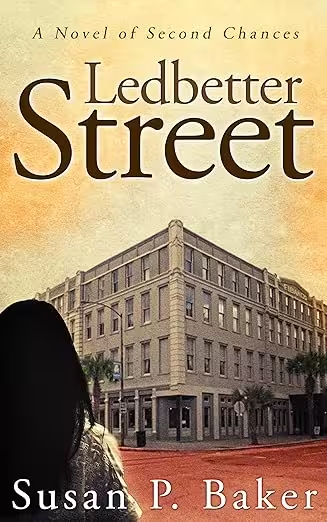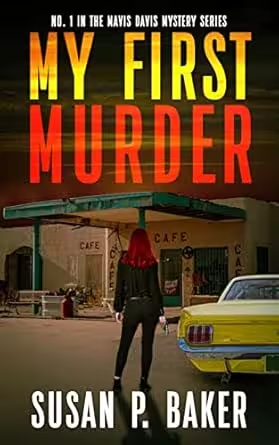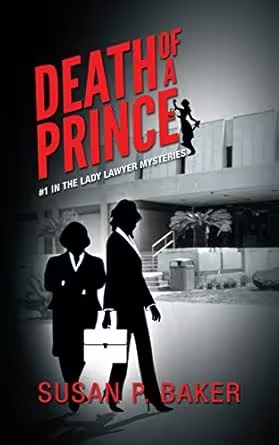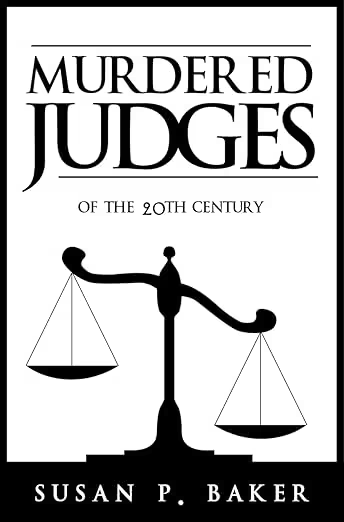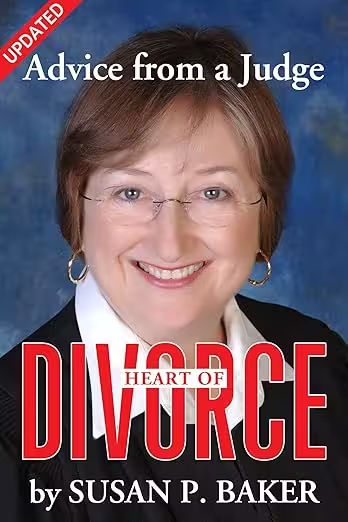Welcome to True Crime November! This month, we’re welcoming Former Texas Judge Susan P. Baker. Susan P. Baker has a vast experience in the justice system that we are immensely intrigued by! It’s definitely not every day that you get the opportunity to meet someone with a background like hers. So we hope you enjoy learning about this fascinating woman too!
A Little About Susan P. Baker
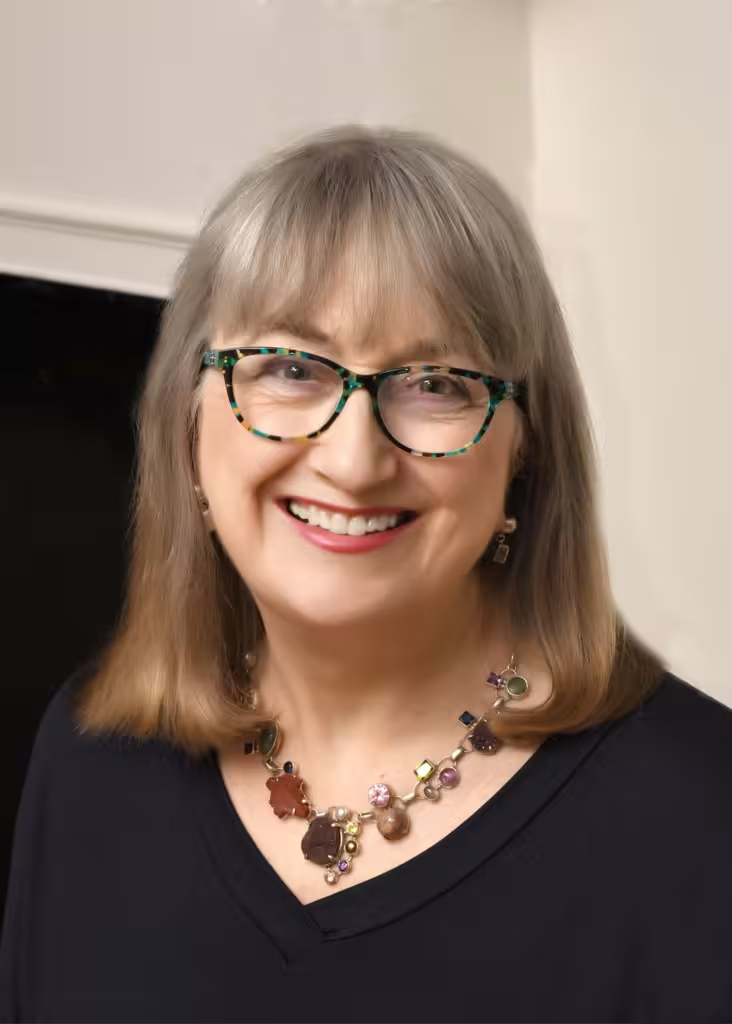
Susan P. Baker, a native of Galveston, Texas, is the author of 12 mystery/suspense novels, two nonfiction titles, and a collection of short pieces. A retired Texas judge, Susan presided over cases ranging from murder to divorce for 12 years in Galveston, later serving as a visiting judge across Texas for another 12 years. Before her judicial career, she practiced law for nine years and worked as a probation officer for two years. Susan’s extensive experience in the justice system and Texas courts significantly influences her writing, bringing authenticity and depth to her fictional works.
Susan’s latest novel, The Underground Murders, is the sixth installment in the Mavis Davis Mystery Series. She is currently working on the third novel in The Lady Lawyer Mysteries and a standalone suspense novel tentatively entitled The Light in the Barn.
Throughout her life, Susan has traveled the world and, besides Galveston, has lived in Japan, Mexico, Alexandria, VA, Arlington, TX, Fredericksburg, TX, and now Cypress, TX. Among her favorite destinations are England and Australia, where she enjoys visiting her cousins. She is the proud mother of two daughters and Nana to eight grandchildren. Her favorite indulgence is a combination of dark chocolate and raspberries.
Susan is a member of All Author, Alliance of Independent Authors, Authors Guild, Galveston Novel and Short Story Writers, Sisters in Crime, Texas Authors, and Writers League of Texas.
Read more about Susan, sign up for her mailing list, and find her books at https://www.susanpbaker.com
Interview with Retired Judge Susan P. Baker
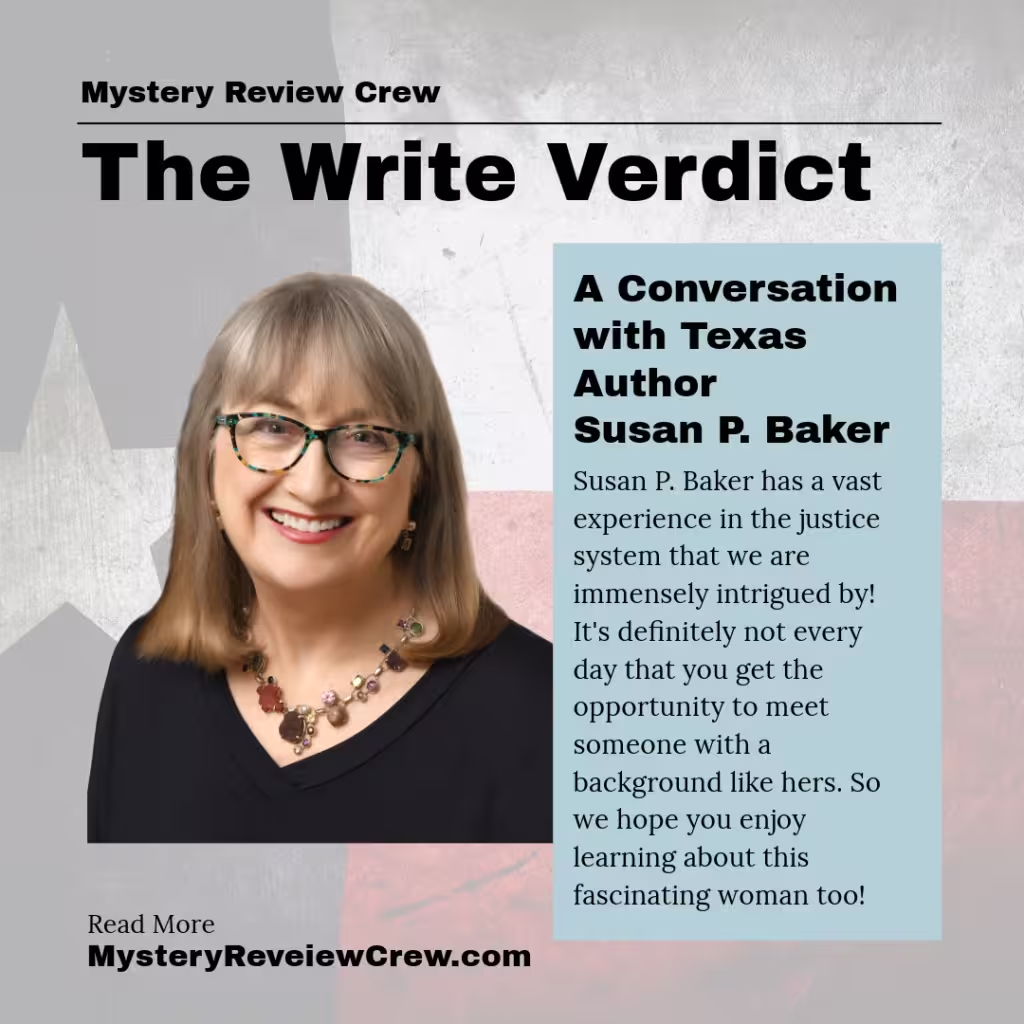
Your novels are filled with rich, authentic details from the justice system. How do you decide which aspects of law and courtroom procedure to include while keeping the story engaging?
Being a 75 year old female who entered a male-dominated field, or should I say several of them [probation, practice of law, judiciary], I experienced negative attitudes mostly from men, but sometimes from women. When I’m writing, I think of how I felt when what I’m writing about happened to me. Or how I would feel if I were the character. I don’t fictionalize procedures. But, people need to realize that each state and the federal government can have different rules. I stick to Texas law and procedure, but someone from another state might say, “You can’t do that.” I know I’ve said that when I read books that are set in different states. For example, when addressing a judge in court, STAND UP!
Texas roots, global experiences—how do the various places you’ve lived, from Galveston to Japan, find their way into your stories?
Well, people are the same everywhere, with their prejudices, likes, and dislikes relative to where they’ve been raised. Cultural differences should be taken into consideration, of course. The geography of where I’ve lived, except Okinawa and Mexico, is in some stories. Plus, places in Texas I’ve visited. So, yes, Galveston, but also Houston. When I was a juvenile probation officer intern in Harris County, I lived in Galveston but worked in Harris County and had to drive all over to conduct home visits. I learned a little bit about Houston neighborhoods. I lived in Fredericksburg for a couple of years and visited there before that, so I set some books in the Texas Hill Country, some fictional towns and some not. I’ve traveled around Texas a bit (as a visiting judge but also on holidays), so I included and am including more and more places in Texas where I’ve been. For example, La Grange, TX, is a sweet little town. I thought people might be enticed to visit those places. Or not.
You’re working on The Lady Lawyer Mysteries. How does this series differ from your Mavis Davis stories in tone, style, and character development?
The Lady Lawyers are mother and daughter criminal defense attorneys. They often spar with each other. And also curse a lot, as defense lawyers do. Mavis is in 1st person. LL is written in 3rd but from both POVs. The LL stories are harder, because they have more legal procedure, and the lawyers need to behave a bit more ethically. Supposedly. 😁 I’m working on one right now, which also addresses some political issues, and I’m not finding it as much fun. I’m bogged down with trying to decide whether the client will be placed in a position he’s asked them not to let happen. If he is, I have a lot more work to do. They have a lot more work to do. That’s all I have to say about that.
What does your writing process look like? Do you outline meticulously, or do you let the story evolve organically?
An idea strikes me. I think it over. I do a few pages of stream of consciousness, break it down into chapters, and use those as jumping-off points. If I leave it alone, it will evolve in my brain. When I first started writing and had less time, I was more organized and wrote more because I had less time. I’m trying to do more now and be more organized.
With so much experience in the legal field, are there any legal myths or misconceptions in fiction that you find particularly frustrating?
This is a very little thing, but in Texas, probation and parole are two different things, at least in state court (I was a state court probation officer/judge). Parole is after a term in prison. Probation is generally in lieu of prison. People mix up the two terms, but I’m pretty sure in some jurisdictions, they’re the same thing, with the same officers. Silly, but I’ve always been annoyed by that. Someone’s on parole but described as being on probation. Also, many people don’t understand how a judge is elevated to the bench. Some places elected. Some appointed. How are they appointed? Research it for your state. Some of the politics of that appears in Texas Style Justice. People think most legal “things” happen because of merit. Ha! Just look at the US Supreme Court!
Did you always know you wanted to be a writer, or did your passion for storytelling develop over time?
For some odd reason, I always wanted to write since I was a little girl. I’ve always had a vivid imagination. Always wondering, “What if?”
What role does research play in your writing? How do you strike a balance between authenticity and creative freedom?
I’m a researcher if need be. I like research. My Murdered Judges of the 20th Century book took six years to research and write. I still felt there was probably more that I could learn about.
Are there specific themes or recurring motifs that you find yourself exploring in your writing?
What’s not there is the bad guy getting away. I have never liked those stories. See Patricia Highsmith’s Ripley series. I read them, but I didn’t like them. Crime should not pay! Ed McBain (not his real name or his real, real name) had some books like that. I read them and didn’t like the bad guy getting away in them, either. I’m not talking about the 87th Precinct Series, but some others.
How did you decide what your book cover should look like?
Good question. Sometimes, it just pops into my head. One good thing about self-publishing is you can do your own covers. My first book had a cover the publisher chose. I have it framed and on the wall over my computer, but I never thought it worked.
What do you find to be the most challenging aspect of being an author, and how do you navigate those challenges?
Procrastination. What I’ve done is set my own deadlines. On a “macro” level, I announce I’ll have another book out before, say, December 25th. Then, I work toward that. On a smaller level, I tell myself if I’ll just write one chapter, I can go watch TV, take a nap, eat something, etc. I wrote a piece for thestilettogand.com blog that I’m a part of about an author I knew who would write 2 pages a day and then go for a run. Sometimes, I remember him and try to do that.
How do you approach the process of submitting your work to publishers or pursuing self-publishing? What has been your experience?
Here’s an amusing story: with my first novel (in the 1980s), I queried 50 agents and editors who accepted mystery/suspense, all at the same time. I sent it on my attorney’s letterhead and in my attorney’s envelope with my attorney’s return address. I figured everyone opened letters from lawyers or should. I received nearly 100% response. That wouldn’t happen today.
I no longer submit to publishers or agents. A number of years back, I grew tired of waiting for responses. I figured I’d aged out of that process that I could die of old age waiting. The last agent I submitted to had told me at a conference if I’d cut the novel I’d pitched by 20,000 words, she’d be glad to look at it. I did. I sent it. I never heard from her. That was it. After that, I taught myself self-publishing. There were problems when I started out, but there always are. With self-publishing, authors can do pretty much what they want, so long as they’re willing to accept the consequences. My best advice: don’t publish anything unless you’ve had it edited. Make it as perfect as you can.
Check out Susan P. Baker’s Books
Fiction Books:
Ledbetter Street
Marian Reid was forced by her mother to give away her son.
For forty years, Marian has grieved the loss of her child. She’s fought for him in the courts and lost twice but has never lost hope. Her “child,” Robert, is an autistic person. Now grown, he’s often child-like and in the need of supervision.
Marian has a pre-owned clothing shop, which she lives above, on Ledbetter Street—a street full of shops and galleries and artists and restaurants. The women who live here provide friendship, support, and love for each other when they find themselves in troublesome predicaments.
When Robert’s custodian, who has become a dear friend, is diagnosed with Alzheimer’s, Marian sees a pathway to finally getting her son back.
Marian’s controlling mother, Claire, learns Marian is seeking guardianship. Claire interferes, siding with the state worker who wants to place Robert in a home over a thousand miles away, which forces Marian back into court. Additionally, Robert’s father, Bryan, who has never known of Robert’s existence, wants to assert himself into Marian’s life. Will he welcome a package deal?
This is a story of the mothers, the children, the friendships, and the personal tragedies of people who have become a family by virtue of their choice of home. When you enter the community of Ledbetter Street, you may never want to leave.
My First Murder: Book 1 in The Mavis Davis Mystery Series
SOMEONE STRANGLED A MYSTERY WOMAN
When a mystery woman named Doris Jones is found strangled, Houston’s newest detective, Mavis Davis, is determined to prove her worth by taking on the case—even after learning everyone else has turned it down.
Ordered by the police to back off, the defiant and feisty Mavis travels from Houston to north Texas, where she uncovers corruption at the highest levels.
Can Mavis survive long enough to find the killer and expose the deep-seated scandal in the heart of Texas, or will the forces against her catch up first?
Death of a Prince: Book 1 in The Lady Lawyer Mysteries
Attorney Phillip Parker did a nosedive off his beach house balcony. Was it suicide or murder?
When Criminal defense attorney, Sandra Salinsky, arrives at the home of Phillip Parker, who called himself the Prince of Personal Injury, she finds Parker flattened on a concrete patio below his beach house bedroom. He had been alive when she’d departed his party the night before.
Besides Parker, five people had remained at the house. Parker’s long-time girlfriend, his law partner (Sandra’s lover), Parker’s mentee (an attorney from his office), the young attorney’s fiancée, and the beach house caretaker.
After police make an arrest, the defendant seeks out Sandra to handle the defense and convinces her to take the case. Sandra is law partners with her mother, who, after much debate, agrees they should provide representation.
They soon discover who is assigned—the chief assistant district attorney—who Sandra considers the prosecutor from hell. She’s well-acquainted with him since she used to be an assistant in that office, too. He’ll spare no resources in getting a conviction.
When the lawyers are in the preliminary hearing waiting on another of the partygoers to testify and help clear their client, that witness turns up dead. More determined than ever, the prosecutor aims to ask the jury for the death penalty. Sandra and Erma must formulate a defense that will save the defendant from the needle and flush out the real killer.
The pair delve deeper into the attendees’ actions on the night of the party. Everyone had means and opportunity, but what about motive? As the lawyers look closer, they realize they’ve become a threat to the killer, especially Sandra who is lead counsel and known to stick her nose in where it doesn’t belong.
Will they figure out who helped Parker over the side of his balcony and clear their client, or will Sandra be the next victim? Once she realizes who the murderer is, Sandra finds herself fleeing down the Galveston beachfront in the middle of the night. Will she get away or will she be caught and killed?
On Goodreads, Amazon, and Bookbub.
Check out some of Susan P. Baker’s non-fiction books, too!
MURDERED JUDGES: Of the 20th Century
…a spectacular compilation of stories of American judges who were tragically killed…” Jason Walker, Historian, Texas State Cemetery
42 True Stories of Judges who were assassinated by strangers, knocked off by family members, or otherwise met a mysterious end.
“An amazing amount of research and assembly of facts to show dangers related to the judiciary as well as failure to deal with the mental health problems and related needed treatment often required and more often ignored.” Honorable Garvin Germany (Deceased).
“This book should be mandatory reading for anyone who has ever advocated that security for judges and courtroom personnel is one of those nonessential luxuries that can always be sacrificed for more ‘important’ concerns. Judge Susan Baker has not only created a well-researched work, but has made it a darn good read. It’s loaded with the kind of action and suspense found in adventurous fiction, but it’s more fascinating and enjoyable because it’s all absolutely true.” Ronald F. Vella, CSR, Official Court Reporter (Retired)
Advice From A Judge: Heart of Divorce
Advice on How To Do Your Own Divorce and Recover Quickly. Expert Advice to a Fast and Pain Free Divorce. From making the decision to divorce to preparing for separation to representing yourself or hiring an attorney to what to do about a bad judge, this book walks the litigant through the system, with heart, humor, and down to earth advice. Additionally, the judge talks plainly about what a person should and shouldn’t do during and after the divorce and recovering as quickly as possible.


